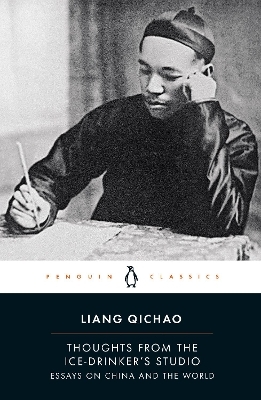
Thoughts From the Ice-Drinker's Studio
Essays on China and the World
Seiten
2023
Penguin Classics (Verlag)
978-0-241-56878-1 (ISBN)
Penguin Classics (Verlag)
978-0-241-56878-1 (ISBN)
'China's first iconic modern intellectual. His lucid and prolific writings, touching on all major concerns in his own time and anticipating many in the future, inspired several generations of thinkers' - Pankaj Mishra
'I have been waiting a very long time for a volume like this one, [it is] a real milestone [...] Peter Zarrow has finally undertaken the considerable scholarly effort to translate, masterfully and lucidly, key essays from Liang Qichao' - Leigh Jenco
'A country does not become corrupt and weak overnight. Rather, we are now reaping the evil harvest of what previous generations sowed.'
The power, anger and fluency of Liang Qichao's writings make him one of the towering figures in modern Chinese literature. He saw his great, almost unmanageable task as an attempt to write China into the new era - to provide an ancient country, devastated by civil war and foreign predators, with the intellectual equipment to renew itself.
Liang said that he wrote from an 'ice-drinker's studio', implying that underneath his dispassionate, disabused and rational tone lay an ardour and passion which only ice could cool. China could only recover through a clear-sighted, informed understanding of its enemies - and by engaging in a thorough-going self-critique. Liang did not propose aping the West but taking only what China needed to 'renew the people' and create 'new citizens'. Then China would be able to expel its invaders, reform its society and become a great power once more.
This selection of pieces shows Liang's extraordinary range and the burning sense of mission which drove him on, attempting to galvanize and refresh an entire nation. Blending together Confucianism, Buddhism and the Western Enlightenment, Liang's ideas about nation, democracy, and morality had a profound impact on Chinese visions of the political order, though the China that eventually emerged from the further disasters of the 1930s and 1940s would be a very different one.
'I have been waiting a very long time for a volume like this one, [it is] a real milestone [...] Peter Zarrow has finally undertaken the considerable scholarly effort to translate, masterfully and lucidly, key essays from Liang Qichao' - Leigh Jenco
'A country does not become corrupt and weak overnight. Rather, we are now reaping the evil harvest of what previous generations sowed.'
The power, anger and fluency of Liang Qichao's writings make him one of the towering figures in modern Chinese literature. He saw his great, almost unmanageable task as an attempt to write China into the new era - to provide an ancient country, devastated by civil war and foreign predators, with the intellectual equipment to renew itself.
Liang said that he wrote from an 'ice-drinker's studio', implying that underneath his dispassionate, disabused and rational tone lay an ardour and passion which only ice could cool. China could only recover through a clear-sighted, informed understanding of its enemies - and by engaging in a thorough-going self-critique. Liang did not propose aping the West but taking only what China needed to 'renew the people' and create 'new citizens'. Then China would be able to expel its invaders, reform its society and become a great power once more.
This selection of pieces shows Liang's extraordinary range and the burning sense of mission which drove him on, attempting to galvanize and refresh an entire nation. Blending together Confucianism, Buddhism and the Western Enlightenment, Liang's ideas about nation, democracy, and morality had a profound impact on Chinese visions of the political order, though the China that eventually emerged from the further disasters of the 1930s and 1940s would be a very different one.
Liang Qichao (1873-1929) was a reformist intellectual, who facing brutal repression fled to Japan where he lived for fourteen years. His long exile, travels and writing - of fiction, journalism and above all essays - gave Liang a unique authority in the first years of the twentieth century. Peter Zarrow is Professor of History at the University of Connecticut and Adjunct Research Fellow at the Institute of Modern History, Academia Sinica. He has held teaching and research positions in Australia and Taiwan, and he has published extensively in English and Chinese on the intellectual and cultural history of China in the nineteenth and twentieth centuries.
| Erscheinungsdatum | 19.10.2023 |
|---|---|
| Einführung | Peter Zarrow |
| Mitarbeit |
Anmerkungen: Peter Zarrow |
| Übersetzer | Peter Zarrow |
| Verlagsort | London |
| Sprache | englisch |
| Maße | 129 x 198 mm |
| Gewicht | 202 g |
| Themenwelt | Literatur ► Essays / Feuilleton |
| Geisteswissenschaften ► Geschichte ► Regional- / Ländergeschichte | |
| Geisteswissenschaften ► Sprach- / Literaturwissenschaft ► Anglistik / Amerikanistik | |
| Geisteswissenschaften ► Sprach- / Literaturwissenschaft ► Literaturwissenschaft | |
| ISBN-10 | 0-241-56878-1 / 0241568781 |
| ISBN-13 | 978-0-241-56878-1 / 9780241568781 |
| Zustand | Neuware |
| Haben Sie eine Frage zum Produkt? |
Mehr entdecken
aus dem Bereich
aus dem Bereich
Erinnerungen
Buch | Softcover (2024)
Pantheon (Verlag)
CHF 22,40
Universalgelehrter, Polarreisender, Entdecker
Buch | Hardcover (2024)
mareverlag
CHF 39,20


